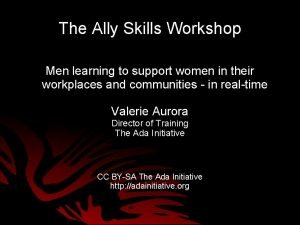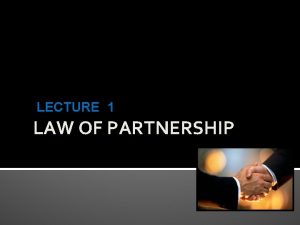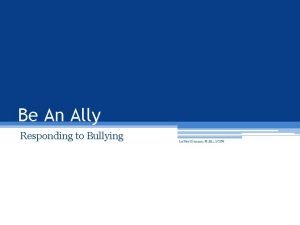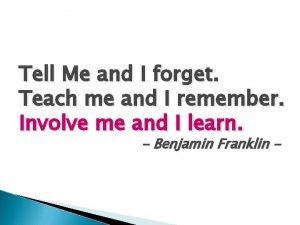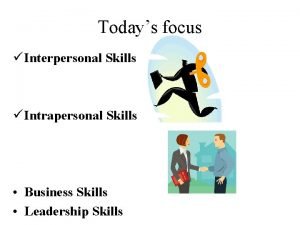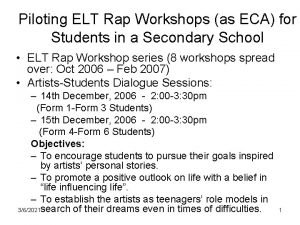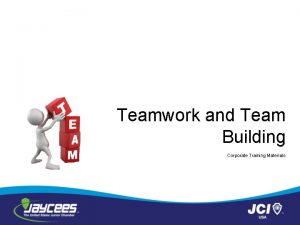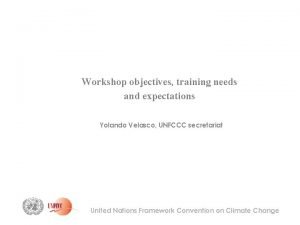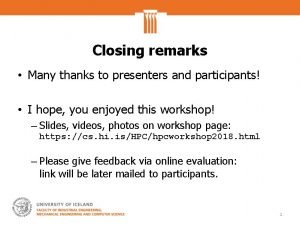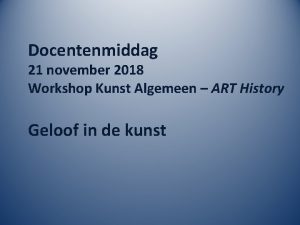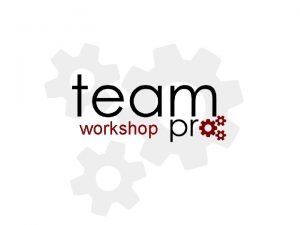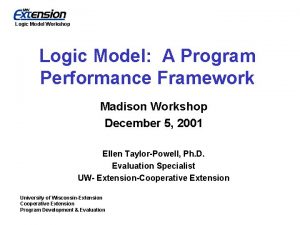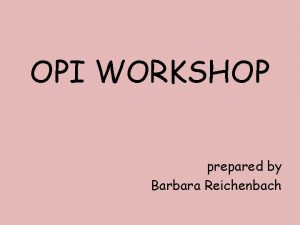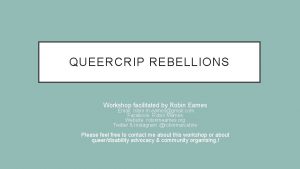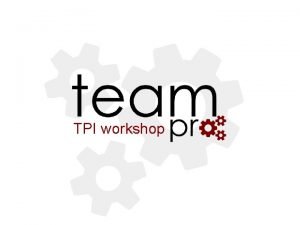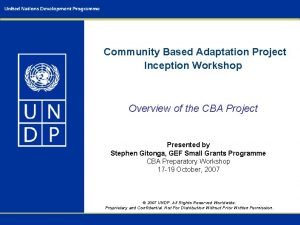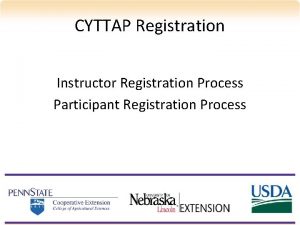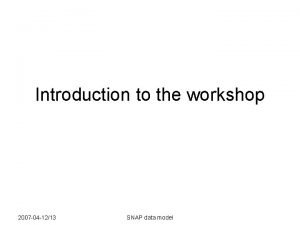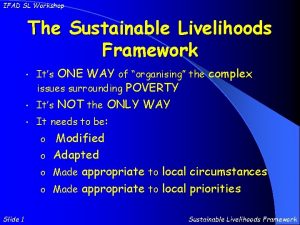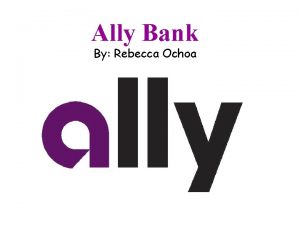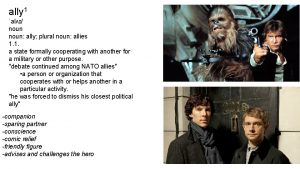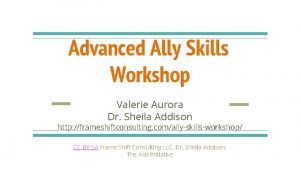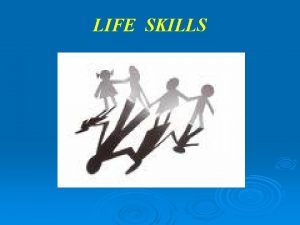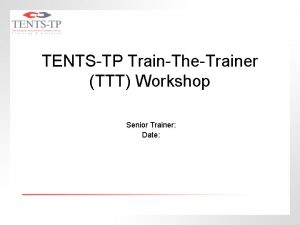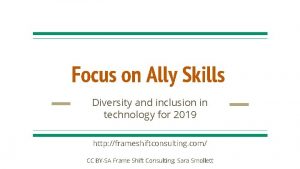frameshiftllc Welcome to the Ally Skills Workshop TTT


























































































































































- Slides: 154

@frameshiftllc Welcome to the Ally Skills Workshop TTT! We're so happy you could join us today! A few requests: 1. Please use headphones if at all possible! 2. Rename yourself: click on "Participants, " mouse over your name, click on "Rename, " type in the name and pronouns you want other people in the meeting to use. Example: "Valerie (she/hers)". If you aren't sure what you want people to use, you can opt-out. 3. Download the files at https: //files. frameshiftconsulting. com/ttt/ 4. Feel free to turn off your video, use your favorite virtual background, or show us your pet!

Ally Skills Workshop Train-the-trainers Valerie Aurora (she/hers) http: //frameshiftconsulting. com CC BY-SA Frame Shift Consulting, Dr. Sheila Addison, Ada Initiative

@frameshiftllc Schedule Day 1 ● 15 min: Introduction ● 45 min: Example Ally Skills Workshop ● 60 min: Preparing to teach the workshop ● 30 min: Break! ● 60 min: How to teach the workshop ● 30 min: Q&A 5 minute break on the hour, 90 second break on half-hour

@frameshiftllc Schedule Day 2 ● 60 min: Reframing questions exercise ● 60 min: Students teach scenarios ● 30 min: Break ● 60 min: Students teach scenarios ● 30 min: Q&A session & freeform discussion 5 minute break on the hour, 90 second break on half-hour

@frameshiftllc What is the Ally Skills Workshop? Teaching people with privilege how to support more marginalized people in everyday ways “Ally skills” vs. “allies”: focuses on actions rather than selfidentification as a "good person" Mainly small group discussion and group report-out Audience: Volunteer-only, ideally 20 -40% people from marginalized groups

@frameshiftllc Facilitating the Ally Skills Workshop is rewarding “Can we get more training like that? ” actual comment from student Watch people have “Aha” moments Take action to end social injustice Highly interactive, time flies No two workshops are ever the same

@frameshiftllc Facilitating the Ally Skills Workshop is hard People ask tough questions People tell you emotionally intense things during breaks People say discriminatory things without realizing it People get upset when they are confronted with their privilege or bias You will have to kick someone out eventually

@frameshiftllc Facilitating the Ally Skills Workshop is hard Many companies have some conflict between making upper management wealthier and the well-being or values of employees HR is often at the intersection of this conflict and teaching the workshop can highlight this pain point Staying away from legal advice or human resources rules is hard but often necessary

@frameshiftllc Workshops are better when. . . Facilitator has significant experience being marginalized Facilitator has a significant source of power or privilege Facilitator is both compassionate and firm Two people with different experiences co-facilitate

Example Ally Skills Workshop with one scenario

Ally Skills Workshop Valerie Aurora Frame Shift Consulting http: //frameshiftconsulting. com/ally-skills-workshop/ CC BY-SA Frame Shift Consulting LLC, Dr. Sheila Addison, The Ada Initiative

@frameshiftllc Format of the workshop ● 20 minute introduction ● 2. 5 hours group discussion of real-world scenarios ● 10 minute wrap-up and Q & A With a 10 minute break every hour and a 90 second stretch break every 30 minutes

@frameshiftllc Valerie Aurora Founder Frame Shift Consulting Taught ally skills to 3000+ people in Spain, Germany, Australia, Ireland, Sweden, Mexico, New Zealand, UK, South Africa, and across the U. S. Linux kernel and file systems developer for 10+ years Valerie Aurora (she/hers)

@frameshiftllc Let’s talk about technical privilege We are more likely to listen to people who "are technical" … but we shouldn’t be "Technical" is more likely to be granted to white men I am using my technical privilege to end technical privilege! https: //fr. YERZelic. kr/p/ CC BY @sage_solar

@frameshiftllc What is an ally? Some terminology first: Privilege: an unearned advantage given by society to some people but not all Oppression: systemic, pervasive inequality that is present throughout society, that benefits people with more privilege and harms those with fewer privileges

@frameshiftllc Terminology Marginalized person: a member of a group that is the primary target of a system of oppression Ally: a member of a social group that enjoys some privilege that is working to end oppressionand understand their own privilege Actions

@frameshiftllc Ally is a verb, not an identity Being a marginalized person takes no action - it is an identity Acting as an ally is about action - it is not an identity, which is why we talk about "ally skills" instead of "allies" Depending on what is most relevant about you to the situation, you may switch between being marginalized and acting as an ally

@frameshiftllc Example Privilege: The ability to interview for a job and have the interviewer assume that if you have children, you will continue doing a good job at work Oppression: Family expectations that mothers do more childcare, belief that mothers don't want to do paid work, financial systems unwilling to extend credit to mothers, laws that put more burdens on mothers than fathers, paying men more than women. . .

@frameshiftllc Example Marginalized person: Any woman who wants to work for pay for an employer, regardless of her plans for children Ally: A man who takes on significant childcare responsibilities, donates to women’s causes, votes for feminist candidates and laws, speaks up at work against stereotypes about mothers, reads news articles about privileges fathers enjoy and mothers don't. . .

@frameshiftllc Why focus on ally skills? In an experiment, researchers found that when marginalized peoplework to increase diversity, supervisors give them worse performance evaluations But when more privileged people work to increase diversity, it does not harm their performance evaluations (and may improve them) Does valuing diversity result in worse performance ratings for minority and female leaders? http: //amj. aom. org/content/early/2016/03/03/amj. 2014. 0538. abstract

@frameshiftllc Exercise: Identify your power and privilege Privilege and power are often invisible to people who have them, but identifying them helps you act as an ally This exercise is voluntary - you do not have to do it If people assume you have a privilege that you do not, you can make your own decision about whether to include it http: //files. frameshiftconsulting. com/asw/privilege. pdf

@frameshiftllc What did you think? Do you have more or less power than you thought? Do you have more or less privilege than you thought? Any surprises or things you hadn't thought about before? https: //flic. kr/p/H 2 c. L 7 F CC BY-SA jason gessner

@frameshiftllc What this workshop is not A certification, an apology, or a "getout-of-jail-free card" Representing anyone's employer or giving legal advice Time to discuss whether oppression exists, is bad, should be stopped, etc. https: //flic. kr/p/97 JC CC BY Mark Strozier

@frameshiftllc Basics of ally skills Be short, simple, firm Don't try to be funny Play for the audience Practice simple responses Pick your battles

@frameshiftllc While you're trying to help one group, don't be: ● ● ● ● ● sexist homophobic transphobic racist ableist classist ageist CC BY-SA Alan Levine https: //flic. kr/p/9 dgoh. A body-shaming and don't describe people as sexually undesirable, unattractive, etc.

@frameshiftllc Awkward. . .

CC BY yvonne n on Wikimedia Commons

CC BY Tom Thai https: //flic. kr/p/6 w. LBVM

CC BY-SA 4028 mdk 09 on WIkimedia Commons

What if I make a mistake? Apologize, correct yourself, and move on.

One of my mistakes: "You guys" CC BY-SA Jenna St Martin photo

@frameshiftllc Help us create a safer space You may leave or return at any time, for any reason, without explanation This workshop is not recorded This workshop is designed to be voluntary Please anonymize if you repeat sensitive stories Share at the level of people you just met at a conference

@frameshiftllc Preparing for group discussion Each group will choose a moderator to interrupt people who are speaking too much and invite others to speak Feel free to moderate the moderator Choose someone to take notes and report what you talked about, and rotate this person each scenario Joining groups is optional

@frameshiftllc A few more tips for group discussion There aren't any trick questions If you're not sure of the situation, pick one (or more) interpretations and discuss it Focus on how someone could act as an ally in this scenario, not as a marginalized person "You" in the scenario description is a theoretical person who could act as an ally, not a literal "you"

Scenarios & group discussion

@frameshiftllc Scenario: What could an ally do? You are in a meeting about how to raise your organization's low rate of promotions of people from a marginalized racial group. A colleague of yours says, "I'm all in favor of fairness and equality, but let's be careful not to lower the bar. " Remember, choose your notetaker and moderator!

@frameshiftllc Tip: Reframe the discussion Assumption: at present, everyone has equal access to promotion, regardless of race or ethnicity Reality: People from marginalized racial/ethnic groups face a much a higher bar than people of dominant race/ethnicity, who often get exceptions to the process Reframe: "Actually, the problem is that marginalized people have to pass a higher bar, and we need to fix that. "

Goal-setting exercise http: //files. frameshiftconsulting. com/asw/goals. pdf

@frameshiftllc Advanced ally skills Treat ally actions as bare minimum expectation Follow and support leaders from marginalized groups Follow your discomfort: if something makes you feel bad, find out more and understand why before reacting When you make a mistake, apologize, correct yourself, and move on

End of example Ally Skills Workshop

@frameshiftllc Preparing to teach the workshop Customize the workshop introduction Recruit participants Choose scenarios Review resources on fighting oppression Practice facilitation skills

@frameshiftllc Customize the workshop introduction Create your introduction slides Include some privilege you have If more than one facilitator, decide which person will present which parts

@frameshiftllc Exercise: Identifying your power and privilege Find the power and privilege exercise you filled out Identify a privilege that makes teaching the workshop easier for you Write a 1 -2 sentence introduction for yourself that includes one privilege and explain how it gives you the opportunity to make the world better Then we will introduce ourselves, with gender pronouns

@frameshiftllc Selecting workshop participants Participants must be volunteers - NON-NEGOTIABLE Screen participants in advance for public workshops Avoid large power differences between participants (usual rule: only three levels of hierarchy in a workshop) Ideal class size is 20 to 30 participants Aim for 20 -40% members of marginalized groups

@frameshiftllc Do not record or broadcast the workshop! People won't feel safe asking questions or having discussions Recording is possible if you edit out participants

@frameshiftllc Choosing scenarios Scenarios are real-world examples of situations in which people can act as allies that the participants will discuss 3 - 7 scenarios per workshop Start and end with easy scenarios Slides on web sites include some scenarios Ask participants for suggestions in advance

@frameshiftllc General facilitation skills Practice politely but firmly standing your ground Cultivate compassion to the entire group Practice smiling, nodding, and praising Practice apologizing, correcting yourself, and moving on Practice admitting you don't know the answer More resources in the Facilitator's Guide

@frameshiftllc Recommended reading/watching/listening ● ● ● ● Facilitator's guide Ally Skills Workshop handout Ally Skills Workshop video (edited) Dear Ally Skills Teacher https: //dearally. com "Better Allies" by Karen Catlin “Feminism is for Everybody” by bell hooks “Women, Class, and Race” by Angela Davis "So You Want to Talk About Race" by Ijeoma Oluo

@frameshiftllc Feel free to change the workshop This next section is about understanding why each part of the workshop is there You can change, remove, or add parts to make it better for your organization if you have different conditions Open up the workshop slides to follow along with the description of how and why each part exists https: //files. frameshiftconsulting. com/asw/slides. pdf

@frameshiftllc Introducing the workshop Ask people to add gender pronouns to names, optionally Give credit according to the terms of the Creative Commons Attribution-Share. Alike license Optionally ask why people came to the workshop Introduce yourself Describe the high level format and schedule

@frameshiftllc Acknowledge a privilege and explain it Start by calling out one of the ways that you have privilege and how you are using it to end inequality Define privilege, oppression, etc. Give a concrete example that is non-obvious to the majority of your audience This makes it safe for the audience to own their privilege

@frameshiftllc Educate them on privilege and ally actions Share some research on different response to ally action versus self-advocacy Remind people that the goal is to act as an ally in ways that ultimately destroy whatever privilege they are using Have the class do the privilege and power identification exercise

@frameshiftllc Limit the scope of the workshop Each line on this slide is about preventing a bad thing that happened in a past workshop by limiting scope ● Not a way to get out of mistakes, past or future ● Facilitator will not discuss legal advice or HR policies ● No debates about if oppression exists, is bad, should be fought Refer back to this slide to stop digressions

@frameshiftllc Review basic ally skills People have tons of self-imposed rules for responding to oppression: must be witty, well-researched, etc. Identifying and lowering these standards increases chances of taking action Emphasize “do this while not harming other groups” - this happens a LOT otherwise

@frameshiftllc Break the tension Everyone is pretty nervous! Talking about oppression, racism, sexism, etc. is super hard Use cat photos or some form of (truly) harmless unrelated humor to let them know it is okay to laugh or have fun as long as they aren't harming anyone If it doesn't work right away, keep talking about how awkward the awkwardness is until someone laughs

@frameshiftllc Talk about what to do if someone makes a mistake Answer: apologize, correct yourself, and move on Give other people room to make mistakes by sharing a minor mistake you made, and how you responded Sharing a mistake models vulnerability, apologizing, and correcting yourself Do not use an experience that is highly emotional or painful for either you or others

Sharing a story example: "You guys" CC BY-SA Jenna St Martin photo

@frameshiftllc Exercise: Share a story about a mistake you made Think of a time you did or said something oppressive that you can share with the class Choose something mild that won't upset people a lot Include what you did afterwards: apologized, made amends, developed a new habit, etc. Tell the story to your group

@frameshiftllc Review safer space parameters Check for recordings going - often you are being recorded without knowing it! The goal is to make people aware of both reasons to trust and reasons to doubt Lead by example - leave names and identifying details out of stories

@frameshiftllc Forming groups Form groups of 4 - 6 people using Zoom breakout feature If possible, have a mix of gender pronouns in each group Participation in groups is voluntary - just don't join Re-assign groups every 2 - 3 sessions so people can get away from bad experiences All this produces better discussions

@frameshiftllc Give instructions for organizing groups First scenario discussion starts with two assignments: BRIEF introductions including optional gender pronouns Choose a moderator and notetaker Remind them before you send them to the breakout rooms This produces better discussions

@frameshiftllc Give them final discussion tips Assure them that there are no trick questions Tell them to make up details if they feel they need them Ask them to focus on how an ally could respond, not the person being marginalized Explain that the "you" in the scenario is a theoretical person who could act as an ally, not literally "you"

@frameshiftllc Why all this preparation? Without all this, we reproduce oppression inside the workshop - privileged people dominate discussion With all this, oppression can still happen in group discussions, but it is less common Rearrange groups to help reduce bad experiences Best way to learn ally skills is to do them in the workshop!

@frameshiftllc Guiding scenario discussion Each scenario takes about 15 - 20 minutes total Read the scenario and ask if anyone has questions Copy scenario into text chat Tell them to discuss for 5 - 8 minutes and start breakout rooms Close breakout rooms 60 seconds before time is up to allow for 60 second delay/warning

@frameshiftllc Guiding scenario report-outs Starting with a different group each time, ask the notetaker to report out major points of discussion Ask them not to repeat things other groups already said and praise anyone who does this Briefly affirm good suggestions and explain bad suggestions (really bad ones immediately)

@frameshiftllc Guiding scenario report-outs Wait till end of report-out to add any missed points - give participants a chance to discover them first Write down points you want to cover and cross them off Certain questions almost certainly will come up in certain scenarios Example slides come with “tip” slides in between scenarios that have useful links/concepts/explanations

@frameshiftllc Practice politely but firmly standing your ground Choose a moderator in your breakout room Moderator chooses facilitator and questioner Suggested argument "Introverts are a marginalized group" Facilitator politely but firmly responds with facts, then shuts it down

@frameshiftllc Suggested text for polite/firm/stand your ground Arguments: Introverts are at a disadvantage, introverts should get accommodations, compare with other marginalizations Responses: Little evidence for introvert/extrovert difference in treatment, environment, intersectionality, trivializing marginalization, ask for help from others Moving on: Let's take it offline, want to get to other topics, let's talk after class

@frameshiftllc Summary of ideal facilitation style Affirm and praise frequently - smile and nod Be polite but firm about what you know to be true Let participants come up with answers first whenever possible Summarize missed points at end of discussion (use written notes and mark points off as people say them)

@frameshiftllc Ending the workshop Do goal-setting exercise Explain more advanced ways to continue education in ally skills Thank everyone for participating, tell them it was a great workshop because they participated, ask them to give themselves a round of applause Stick around for questions and discussion

@frameshiftllc Send an anonymous survey after the workshop Schedule time to read the results of the survey when you can handle negative comments (but mostly they will be positive) You want some negative feedback Will always get "too hard" and "too easy" (same workshop)

@frameshiftllc What if someone joins late? Do NOT allow people to participate in group discussion if they missed the introduction - this is crucial Feel confident in your ability to say no and tell people they have to leave If you are feeling generous, you can go over the handout with them while the rest of the groups are discussing a scenario (or if you have two facilitators, one can do this)

@frameshiftllc What if you have to ask someone to leave? Call a 5 minute break Pull them aside where you can't be overheard Say something apologetic and non-blaming about how the workshop isn't a good fit, etc. Suggest that they can attend another workshop Keep repeating yourself until they leave

@frameshiftllc Hard stuff rarely happens Asking someone to leave happens ~1% of workshops Someone obnoxious happens ~5% of workshops You can designate someone to help you It's okay to make a mistake - not the end of the world If your career is at risk, protect your career first

@frameshiftllc Practice interrupting with role play Interrupting is a crucial facilitating skill Interrupting can be both good and bad; interrupting in ways that reinforce oppression is bad Interrupting is vital when someone is saying something harmful Interrupting is important when someone is taking up too much time

@frameshiftllc Interrupting exercise: Example A participant said something sexist and another participant pointed it out First student apologized and started to defend themself at length I said "Thank you for demonstrating to the class how to apologize, correct yourself, and move on" until they stopped talking

@frameshiftllc Useful interrupting phrases "I'm so sorry, but I want to be sure everyone has time to speak. Could you summarize? " "I think what you're trying to say is X, is that right? " "I hate to interrupt, but we are running out of time for the other topics. " "I'm going to interrupt you and ask you to follow up after the workshop, is that okay? "

@frameshiftllc Exercise: Practice interrupting with role play One person read out loud from the facilitator's guide (or talk about something extemporaneously) Another person practices interrupting them Switch roles and repeat until everyone has practice interrupting

@frameshiftllc Correcting mistakes made in good faith Often someone will say something that reinforces oppression when they are intending to do the opposite Patronizing: "You're so articulate!" Implied exclusion: "This year, we all just found out [common knowledge for a marginalized person]. " Reinforcing stereotypes: "I assigned that to you because you're so good at [stereotype that you don't like]. "

@frameshiftllc Useful phrases for good faith correction Acknowledge good faith, be compassionate, rephrase "I understand that you were trying to be complimentary, but what I heard was [oppressive comment]. " "I used to say similar things about [group], but then someone kindly told me that it was hurtful in [X way]. " "I appreciate that you care about being inclusive. What do you think about [more inclusive version]? "

@frameshiftllc Example: Correcting mistakes in good faith A white woman talking to me (also white) about conflict while discussing anti-Black racism in her company says, "We want to feel safe talking about racism with them. " My correction: "I wouldn't put it that way. I would say, we want everyone to feel safe talking about racism. " Her: [long pause] "Thank you for pointing out my mistake so kindly. I learned a lesson and only feel slightly ashamed instead of very ashamed. "

@frameshiftllc Exercise: Correcting good faith mistakes In your group, choose someone to facilitate Take turns role-playing, one person saying the mistake and a second person correcting the mistake Use example mistakes and corrections in chat Repeat until everyone has a chance to play both roles

@frameshiftllc Body language for video Beware of computer face! Your image on students' screens is tiny compared to real life Compensate the same way theater actors or ballet dancers do Over-emote, exaggerate your expressions, use big gestures Val's computer face

@frameshiftllc Exercise: Practice emoting more (optional) Choose a timekeeper/moderator Each person talks for 60 seconds, trying to emote more If they aren't emoting "enough, " make a "more" motion with your hands If they are emoting "enough, " give them a thumbs up When 60 seconds is up, give them a round of applause

@frameshiftllc Start choosing scenarios to facilitate tomorrow This is a great opportunity to practice facilitating when the stakes are lowest Participation is optional You may co-facilitate with a classmate or with a facilitator Example scenarios with extensive notes are in the Facilitator's Guide on page 28

@frameshiftllc Exercise: Reframing questions CC BY Amy https: //flic. kr/p/8 Ldbrd


"Enough About You" Titus Kaphar (2016)

@frameshiftllc Why is reframing questions a useful skill? People will have genuine questions about some apparent contradiction which means they have to be oppressive Usually based on one or more of: 1. Incorrect facts 2. Ignoring systemic oppression 3. Putting onus of change on marginalized/less powerful

@frameshiftllc Reframing example “You say you want us to treat women like everyone else, but then you want us to act differently around women. That's illogical!”

@frameshiftllc Assumptions "Everyone" is "men" All men like this abusive culture What these men like defines "normal" behavior Men should not have to change to accommodate women Systemic sexism does not exist

@frameshiftllc Reframe assumptions "Everyone" includes people of all genders Many people dislike this abusive culture Women should be included in defining "normal" behavior Men should change to accommodate women Systemic sexism exists

@frameshiftllc Reframing reply "I used to think that too, because I thought that the way we were treating people was normal. But then I realized that our culture was only friendly to men who didn't mind being part of abusive culture. When I changed my definition of normal behavior to be welcoming and inclusive of women too, then I realized that we could treat everyone with equal respect and also be more welcoming of women. "

@frameshiftllc Reframing process 1. 2. 3. 4. 5. What assumptions are they making? Are those assumptions true? What systemic oppression is being left out? Where is the burden of change placed? Rewrite the question with facts, inclusion of systemic oppression, onus of change on the privileged 6. Kindly walk them through the thought process

@frameshiftllc Useful reframing phrases "So let's talk about an underlying assumption a lot of us have about that. . . " "I hear you saying XYZ, what are some of the assumptions underlying that language? " "I also used to wonder that same thing, and then I learned. . . " "I used to think that, and then…"

@frameshiftllc Dealing with bad faith participants Some people know they are making logical errors or basing arguments on lies and don't care Debating people acting in bad faith just gives more weight and credit to their arguments than they deserve You can still use reframing techniques, but you should play to the audience, not to the person acting in bad faith

@frameshiftllc How to practice reframing Search for hot button topics on Twitter and read arguments from obvious throwaway accounts Search for debunking of myths about marginalized groups Practice asking the three questions about assumptions, context, and burden of change

Reframing exercises

@frameshiftllc Reframing exercise “Affirmative action gives people of color in the U. S. unfair advantages over white people. How is that not discriminating on the basis of race? ” Assumptions? Systemic oppression? Burden of change?

@frameshiftllc Reframing reply "We agree, giving people unfair advantages on the basis of race is not good. Unfortunately, white people have been the recipients of unfair advantages for centuries and continue to be so today. In order to make society more fair, affirmative action removes a small amount of that unfair advantage. "

@frameshiftllc Reframing exercise “Making jokes about sex isn't sexist. Women like to have sex too. ” Assumptions? Systemic oppression? Burden of change?

@frameshiftllc Reframing reply "Whether or not women like to have sex has nothing to do with whether sex jokes are sexist. Because our society praises men for having sex and dehumanizes women when we talk about sex, sex jokes signal that it is okay to objectify and harm women. I want to make the world less sexist, not more sexist, so I don't make sex jokes. "

@frameshiftllc Reframing exercise “You are infringing on free speech, and how can we have an open and free society without that? ” Assumptions? Systemic oppression? Burden of change?

@frameshiftllc Reframing reply "I agree, an open and free society is really important. What I notice is that some people get lots of speech, and others get silenced. When we defend speech that dehumanizes a whole group of people, we end up with less free speech, and an intolerant and closed society. Many countries have limits on free speech for things as mundane as protecting Disney's right to make money off Mickey Mouse. Let's protect people's lives, too. "

@frameshiftllc You don't have to reframe a lot Questions like this are relatively rare Often the audience can help answer them Your co-facilitator may have an idea You can ask to come back to that after the break You can say "I don't know, but I suspect there is a problem with assumptions/facts/burden of change"

Email Valerie the scenario you want to facilitate! See page 28 of guide for scenarios

Scenario facilitation practice

@frameshiftllc Practice leading scenario discussion Your participation is voluntary Choose an existing scenario or create a new one Your choice on feedback: none/any, positive/negative, public/private, instructor/class Your choice on whether participants can deliberately make it harder to facilitate

@frameshiftllc Scenario: What could an ally do? A woman you don't know is standing near your group at a conference or similar event in a male-dominated field. She is alone and looks like she would rather be talking to people.

@frameshiftllc Tip: Pay attention to patterns of discussion Who is speaking most in your group? Is someone having difficulty being heard? Are there patterns related to gender, race, age, or anything else? How do these discussions compare to ones you have in other contexts?

@frameshiftllc Scenario: What could an ally do? At a meeting, a person who is hard of hearing makes a suggestion, but no one picks up on it. Later on in the meeting, a hearing person makes the same suggestion and is given credit for it.

@frameshiftllc Tip: Effective and just meetings Good meetings have the following roles: ● Facilitator ● Timekeeper ● Notetaker ● Gatekeeper https: //frameshiftconsulting. com/speaking/#meeting

@frameshiftllc Scenario: What could an ally do? You are eating lunch in the employee kitchen when a group sits down near you. One person comments loudly “If I ate that, I’d be as big as a house!” A higherweight coworker is sitting nearby and can clearly overhear.

@frameshiftllc Tip: Weight discrimination at work “Fat talk/diet talk” is seen as bonding but creates a hostile environment for other employees Higher weight people face workplace discrimination, particularly women, regardless of ability to do the job Body size is falsely equated with virtue: self-control, hard worker, in good health Workplace “health initiatives” often discriminate against higher weight and disabled employees

@frameshiftllc Scenario: What could an ally do? On a company mailing list, someone writes “How would you explain this [technical thing] to your grandmother? ”

@frameshiftllc Tip: Charles' Rules of Argument 1. 2. 3. 4. Don't go looking for an argument State your position once, speaking to the audience Wait for absurd replies Reply one more time to correct any misunderstandings of your first statement 5. Do not reply again 6. Spend time doing something fun instead http: //geekfeminism. wikia. com/wiki/Charles%27_Rules_of_Argument

@frameshiftllc Scenario: What could an ally do? A Black person in your community points out that a conference in your community has all white speakers. They do this on a social media platform that you actively use to participate in this community. Several other people criticize the Black person for being too abrasive, aggressive, loud, out of line, etc.

@frameshiftllc Tone policing/The "tone argument" When people speak up in support of oppressed groups, it makes people in the dominant group feel guilty and sad A common response is to ask the people speaking up to not hurt the feelings of the dominant group Often this uses the word "angry" and especially "tone" http: //geekfeminism. wikia. com/wiki/Tone_argument

@frameshiftllc Scenario: What could an ally do? You are part of the performance review process at your company. The feedback for several women include comments like "Needs to work on her communication style, " or "too aggressive. " Fewer men's reviews have the same problems.

@frameshiftllc Hint: it’s not the women "When we analyzed a sample of performance evaluations of men and women across three high-tech companies and a professional services firm, we found that women consistently received less feedback tied to business outcomes. [. . . ] 76% of references to being "too aggressive" happened in women’s reviews, versus 24% in men’s. " Shelley Correll and Caroline Simard, https: //hbr. org/2016/04/research-vaguefeedback-is-holding-women-back

@frameshiftllc Tip: Bias interrupters 3 step process from UC Hastings Work. Life Law Center 1. Use metrics 2. Implement bias interrupters 3. Repeat as needed Detailed list of bias interrupters for workplace systems: http: //biasinterrupters. org/

@frameshiftllc Scenario: What could an ally do? A woman in your company goes on maternity leave. You are discussing which projects to assign to people after she has returned, including one that is in her area of expertise and requires some travel. A co-worker says, "She has a small baby, I assume she won't want to travel. "

@frameshiftllc What Works for Women at Work By Joan C. Williams and Rachel Dempsey Four patterns of subtle bias, varying by race, ethnicity, appearance, etc. 1. 2. 3. 4. Prove-it-again The Tightrope The Maternal Wall Tug-of-war

@frameshiftllc Scenario: What could an ally do? A co-worker comes out as trans. Another co-worker assumes you are cis and starts complaining to you privately about how ridiculous it is to expect everyone to start using your co-worker’s new name and pronouns.

@frameshiftllc Tip: Read Captain Awkward Advice blog that answers questions on social interaction from an awkward, geeky perspective Great for "How do I get someone to stop doing something without upsetting anyone? " type of questions (hint: someone is already upset) http: //captainawkward. com

@frameshiftllc Scenario: What could an ally do? At a party at work, a male co-worker makes a joke about how much sex another male co-worker must have had in order to have so many children. Everyone is holding an alcoholic drink.

@frameshiftllc Why talking about sex at work is harmful Double standard for straight sex and gay sex "Family size" talk can be racism & religious discrimination Some racist stereotypes are about sex or genitals Fertility, pregnancy, adoption can be highly emotional

@frameshiftllc Why talking about sex at work is harmful, cont'd Strong pressure to "be cool" about sex Assumes parents are cis and straight Double standard for sex for men and women Sex talk => objectification & harassment of women Take-away: Save talking about sex for outside of work

@frameshiftllc Myths about alcohol and bad behavior The immediate physiological effects of alcohol are: ● Loss of coordination ● Sleepiness ● Difficulty multitasking Everything else (violence, sexual advances, rude comments) is voluntary and under conscious control: http: //www. sirc. org/publik/drinking 4. html

@frameshiftllc How to counter cultural messages about alcohol Don't serve alcohol at all (surprisingly popular!) Serve high quality non-alcoholic beverages Serve at same stations with same prominence More tips on serving alcohol in an inclusive manner, by Kara Sowles: https: //blog. valerieaurora. org/2018/03/30/cross-post-alcohol-andinclusivity-planning-tech-events-with-non-alcoholic-options/

@frameshiftllc Scenario: What could an ally do? On an internal company chat channel with about 50 people, a co-worker is talking about a badly implemented software feature. They write, "That's so ghetto, " followed by a smiling face emoji.

@frameshiftllc Tip: Have a concise code of conduct with examples Have a short, clear, concise code of conduct that focuses on what not to do Specifically list common forms of oppression Put everything else (values, how to be inclusive, etc. ) in separate documents Hand over any dispute over Co. C violations to an expert https: //frameshiftconsulting. com/code-of-conduct-book/

@frameshiftllc Scenario: What could an ally do? Your team announces that the next team-building offsite activity will be playing laser tag.

@frameshiftllc Tip: Inclusive offsites Design your offsite meetings to be inclusive Make a list of marginalized groups and spend time researching how each might feel left out List of more inclusive and less inclusive offsites here: https: //geekfeminism. wikia. com/wiki/Inclusive_offsites

@frameshiftllc Scenario: What could an ally do? In your team's weekly meeting, you notice that the decision ends up being whatever the loudest, most persistent talker wants to do, even when you think it is not the best solution. You also notice that more marginalized people are interrupted more often and speak for less time.

@frameshiftllc Tip: Create psychological safety Psychological safety means an environment in which people take turns sharing information Google study showed the most productive and profitable teams have psychological safety Two elements: sensitivity to others' feelings, and conversational turn-taking (equal speaking time) https: //en. wikipedia. org/wiki/Psychological_safety

@frameshiftllc Scenario: What could an ally do? You are part of a hiring committee. A woman interviewer reports that an applicant refused to make eye contact with her and seemed dismissive of her questions. A man who interviewed the same applicant reports that they were enthusiastic and warm, and advocates strongly for advancing the applicant to the next level.

@frameshiftllc Tip: Listen to and amplify marginalized voices Marginalized people are the early warning system for harmful employees: they often see the signs first If you aren't a member of the marginalized group, you may have difficulty believing experiences like these When a marginalized person shares these experiences, view it as a valuable, limited time learning opportunity Amplify and back up these kinds of reports

Optional Q&A Frame Shift Consulting http: //frameshiftconsulting. com

Alternate slides

@frameshiftllc Welcome to the Ally Skills Workshop TTT Please fill out a name tag & include the pronounsyou normally use. Examples: she/hers he/him/his they/them/theirs Pronouns

@frameshiftllc Schedule 15 min: Introduction 45 min: Preparing to teach 90 min: How to teach the workshop 60 min: Lunch break 60 min: Reframing questions exercise 120 min: Students teach scenarios 30 min: Q&A session & freeform discussion

@frameshiftllc Setting up the workshop space Projector with screen that can be viewed by all participants (microphones optional) Ideally, round tables seating 4 -6 people - no tables is okay, but then arrange chairs in circles Groups should be close enough that everyone can hear one person speaking loudly, but far enough apart they can have conversations at the same time

@frameshiftllc Setting up the workshop space Arrive 30 minutes early to do room setup - it will ALWAYS be wrong Pass out handouts, pens, name tags Place a chair for you to sit in during group discussions that is far enough away to not be obviously listening Move/change anything that seems like it will interfere!

@frameshiftllc Forming groups Forming diverse groups is awkward! What helps: Pre-formed groups via seating arrangements Reminding people that everyone is a volunteer Encouraging people to switch groups at breaks Telling people that discussions are better with lots of different perspectives ● Framing this as an opportunity to hear different points of view people normally don't get to hear ● ●

@frameshiftllc What if someone talks too much in their group? Tell the whole class "If you know you speak a lot, don't speak first and let silence go longer before speaking" Take them aside during a break and say you noticed them speaking a lot Pass them a note Directly ask them to stop speaking in front of everyone

@frameshiftllc Guiding scenario report-outs Ask everyone to stop talking (they won't, use bell) Starting with a different group each time, ask them to report out major points of discussion Ask them not to repeat things other groups already said Briefly affirm good suggestions and explain bad suggestions (really bad ones immediately)

@frameshiftllc Guiding scenario discussion Each scenario takes about 15 - 20 minutes total Read the scenario and ask if anyone has questions Tell them to discuss for 5 - 8 minutes Pay attention to rhythm of discussion, if someone is dominating discussion, etc. and intervene if necessary Give 30 seconds warning before ending discussion

@frameshiftllc Video-specific teaching techniques Meeting prep Sound Video Body language Preventing harassment

@frameshiftllc Meeting prep Send out written tips for using the video system in advance Give people 15 minutes before the meeting starts to troubleshoot and experiment with features Start meeting with a slide with links to slides and other resources and instructions on changing names

@frameshiftllc Sound ALWAYS use headphones/headset/earbuds Ask students to use them to prevent feedback (buy cheap ones and send them) Wired recommended - harder to forget and take with you! Sound breaking up? Turn off video Some groups keep video off by default for this reason

@frameshiftllc Video Use three-point lighting Place camera at eye level, near the video for students Built-in laptop camera works fine Background can be complicated as long as not distracting Virtual backgrounds are great!

@frameshiftllc My setup

@frameshiftllc Preventing harassment on Zoom https: //frameshiftconsulting. com/2020/04/02/tips-for-safer-zoom-meetings/ Turn off "Allow removed participants to rejoin", "Allow private chat", "File transfer", "Annotation", "Whiteboard" features, set "Screen sharing" to "Host only" Send meeting info only to people who register by email Give "Co-host" role to another person to manage waiting room, eject people, mute people
 Sax
Sax Google chrome browser
Google chrome browser Ally v dinath
Ally v dinath Ally
Ally Ally bee x
Ally bee x What does kat fear will happen if she wins
What does kat fear will happen if she wins Ally integrated healthcare
Ally integrated healthcare Elizabethan era sports facts
Elizabethan era sports facts Ally noel
Ally noel Recovery ally training
Recovery ally training Buy ally or diy matrix
Buy ally or diy matrix Presentation practice production method
Presentation practice production method Diagrama ttt
Diagrama ttt Esferoidita
Esferoidita Ttt-järjestelmä
Ttt-järjestelmä Diagram cct
Diagram cct What is ttt diagram
What is ttt diagram You tell me and i forget
You tell me and i forget Gdc arki
Gdc arki Wise men three clever are we
Wise men three clever are we Skills
Skills Ontario skills passport
Ontario skills passport Interpersonal skills and intrapersonal skills
Interpersonal skills and intrapersonal skills Các châu lục và đại dương trên thế giới
Các châu lục và đại dương trên thế giới Tư thế worms-breton
Tư thế worms-breton Thế nào là hệ số cao nhất
Thế nào là hệ số cao nhất Sơ đồ cơ thể người
Sơ đồ cơ thể người ưu thế lai là gì
ưu thế lai là gì Tư thế ngồi viết
Tư thế ngồi viết Cái miệng bé xinh thế chỉ nói điều hay thôi
Cái miệng bé xinh thế chỉ nói điều hay thôi đặc điểm cơ thể của người tối cổ
đặc điểm cơ thể của người tối cổ Cách giải mật thư tọa độ
Cách giải mật thư tọa độ Bổ thể
Bổ thể Tư thế ngồi viết
Tư thế ngồi viết Thẻ vin
Thẻ vin Thể thơ truyền thống
Thể thơ truyền thống Bài hát chúa yêu trần thế alleluia
Bài hát chúa yêu trần thế alleluia Các châu lục và đại dương trên thế giới
Các châu lục và đại dương trên thế giới Từ ngữ thể hiện lòng nhân hậu
Từ ngữ thể hiện lòng nhân hậu Diễn thế sinh thái là
Diễn thế sinh thái là Vẽ hình chiếu vuông góc của vật thể sau
Vẽ hình chiếu vuông góc của vật thể sau Giọng cùng tên là
Giọng cùng tên là Phép trừ bù
Phép trừ bù Tỉ lệ cơ thể trẻ em
Tỉ lệ cơ thể trẻ em Lời thề hippocrates
Lời thề hippocrates Khi nào hổ con có thể sống độc lập
Khi nào hổ con có thể sống độc lập đại từ thay thế
đại từ thay thế Quá trình desamine hóa có thể tạo ra
Quá trình desamine hóa có thể tạo ra Cong thức tính động năng
Cong thức tính động năng Thế nào là mạng điện lắp đặt kiểu nổi
Thế nào là mạng điện lắp đặt kiểu nổi Hát kết hợp bộ gõ cơ thể
Hát kết hợp bộ gõ cơ thể Dot
Dot Thế nào là sự mỏi cơ
Thế nào là sự mỏi cơ Vẽ hình chiếu đứng bằng cạnh của vật thể
Vẽ hình chiếu đứng bằng cạnh của vật thể độ dài liên kết
độ dài liên kết Gấu đi như thế nào
Gấu đi như thế nào Các môn thể thao bắt đầu bằng tiếng đua
Các môn thể thao bắt đầu bằng tiếng đua Thiếu nhi thế giới liên hoan
Thiếu nhi thế giới liên hoan Sự nuôi và dạy con của hươu
Sự nuôi và dạy con của hươu điện thế nghỉ
điện thế nghỉ Một số thể thơ truyền thống
Một số thể thơ truyền thống Trời xanh đây là của chúng ta thể thơ
Trời xanh đây là của chúng ta thể thơ Lp html
Lp html Số.nguyên tố
Số.nguyên tố Fecboak
Fecboak Ipc144 workshop 3
Ipc144 workshop 3 Career guidance presentation
Career guidance presentation Meaning of factual description
Meaning of factual description Workshop rundown
Workshop rundown Disadvantages of team work
Disadvantages of team work Sadlier unit 11 level d completing the sentence
Sadlier unit 11 level d completing the sentence Recommendation letter for workshop
Recommendation letter for workshop Returning warrior workshop
Returning warrior workshop Workshop goals examples
Workshop goals examples Alan wilson msig
Alan wilson msig Action planning workshop
Action planning workshop Warm up activities for teachers workshop
Warm up activities for teachers workshop Vocabulary workshop level d unit 4
Vocabulary workshop level d unit 4 Lhc performance workshop
Lhc performance workshop Capte self study workshop
Capte self study workshop Umich cpt
Umich cpt Sex workshop
Sex workshop How to write a dbq apush
How to write a dbq apush Flight test safety workshop
Flight test safety workshop Vocabulary level d unit 5
Vocabulary level d unit 5 Drag prediction workshop
Drag prediction workshop Pdtoolkit for words their way
Pdtoolkit for words their way Risk workshop slides
Risk workshop slides Ill methodology workshop
Ill methodology workshop Vision workshop agenda
Vision workshop agenda Vocabulary workshop level g unit 1 antonyms
Vocabulary workshop level g unit 1 antonyms Workshop expectations
Workshop expectations Herzlich willkommen zum workshop
Herzlich willkommen zum workshop Modem ems workshop
Modem ems workshop Felexit
Felexit Closing remarks for thesis defense
Closing remarks for thesis defense Isni's workshop
Isni's workshop Case study workshop
Case study workshop Apa bronvermelding
Apa bronvermelding Requirements gathering workshop agenda
Requirements gathering workshop agenda European pesticide residue workshop
European pesticide residue workshop Church leadership workshop
Church leadership workshop Conlang workshop
Conlang workshop Isolde workshop
Isolde workshop Workshop omgaan met onderzekerheid
Workshop omgaan met onderzekerheid Workshop health and safety poster
Workshop health and safety poster Kunst
Kunst Persona creation workshop
Persona creation workshop Vocabulary workshop level f
Vocabulary workshop level f Workshop spelregler
Workshop spelregler Professionalism workshop
Professionalism workshop Partner in crime synonym
Partner in crime synonym Sns workshop
Sns workshop Speed of trust exercise
Speed of trust exercise Kyselyvertailu
Kyselyvertailu Ogsm voorbeelden
Ogsm voorbeelden Vocabulary workshop level d unit 10
Vocabulary workshop level d unit 10 Vj workshop
Vj workshop Career workshop objectives
Career workshop objectives Department of labor employment workshop
Department of labor employment workshop Program logic model examples
Program logic model examples Pst workshop 31
Pst workshop 31 Four cutting tools
Four cutting tools Actfl opi role-play cards
Actfl opi role-play cards Minitab 16
Minitab 16 Tcbc workshop
Tcbc workshop Eames workshop
Eames workshop Workshop spelregler
Workshop spelregler Pbc workshop
Pbc workshop Workshop modular building
Workshop modular building Rapid process improvement workshop
Rapid process improvement workshop Sales readiness definition
Sales readiness definition Benefits workshop
Benefits workshop Herzlich willkommen workshop
Herzlich willkommen workshop Project report on fabrication workshop
Project report on fabrication workshop Combined layout
Combined layout Dmmsm
Dmmsm Eos brussels
Eos brussels Motivation letter workshop
Motivation letter workshop Strategic planning workshop exercises
Strategic planning workshop exercises Agile inception workshop
Agile inception workshop Workshop registration
Workshop registration Gdworkshop
Gdworkshop Ipc 144
Ipc 144 Aufbau einer kerze grundschule
Aufbau einer kerze grundschule Introduction of sheet metal
Introduction of sheet metal The workshop 2007
The workshop 2007 Sl framework
Sl framework Objectives of good layout
Objectives of good layout Vocabulary workshop level f unit 8 synonyms and antonyms
Vocabulary workshop level f unit 8 synonyms and antonyms Level g unit 15
Level g unit 15 Workshop goals examples
Workshop goals examples Wtamu resume workshop
Wtamu resume workshop Businessplan workshop
Businessplan workshop Pwp railway workshop
Pwp railway workshop
